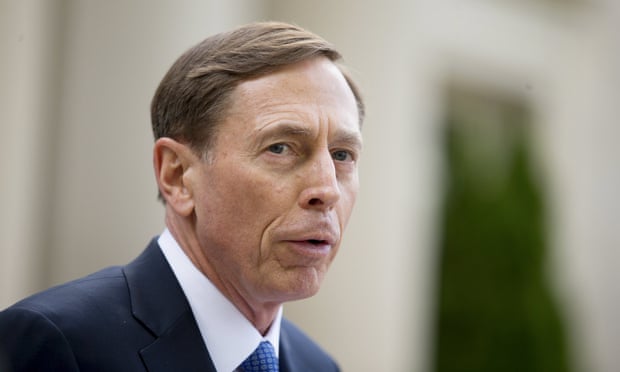Petraeus: US would destroy Russia’s troops if Putin uses nuclear weapons in Ukraine
Former CIA director and retired army general says Moscow’s leader is ‘desperate’ and ‘battlefield reality he faces is irreversible’
The US and its allies would destroy Russia’s troops and equipment in Ukraine – as well as sink its Black sea fleet – if Russian president Vladimir Putin uses nuclear weapons in the country, former CIA director and retired four-star army general David Petraeus warned on Sunday.
Petreaus said that he had not spoken to national security adviser Jake Sullivan on the likely US response to nuclear escalation from Russia, which administration officials have said has been repeatedly communicated to Moscow.
He told ABC News: “Just to give you a hypothetical, we would respond by leading a Nato – a collective – effort that would take out every Russian conventional force that we can see and identify on the battlefield in Ukraine and also in Crimea and every ship in the Black sea.”
The warning comes days after Putin expressed views that many have interpreted as a threat of a larger war between Russia and the west.
Asked if the use of nuclear weapons by Russia in Ukraine would bring America and Nato into the war, Petreaus said that it would not be a situation triggering the alliance’s Article 5, which calls for a collective defense. That is because Ukraine is not part of Nato – nonetheless, a “US and Nato response” would be in order, Petreaus said.
Petreaus acknowledged that the likelihood that radiation would extend to Nato countries under the Article 5 umbrella could perhaps be construed as an attack on a Nato member.
“Perhaps you can make that case,” he said. “The other case is that this is so horrific that there has to be a response – it cannot go unanswered.”
Yet, Petreaus added, “You don’t want to, again, get into a nuclear escalation here. But you have to show that this cannot be accepted in any way.”
Nonetheless, with pressure mounting on Putin after Ukrainian gains in the east of the country under last week’s annexation declaration and resistance to mobilization efforts within Russia mounting, Petreaus said Moscow’s leader was “desperate”.
“The battlefield reality he faces is, I think, irreversible,” he said. “No amount of shambolic mobilization, which is the only way to describe it; no amount of annexation; no amount of even veiled nuclear threats can actually get him out of this particular situation.
“At some point there’s going to have to be recognition of that. At some point there’s going to have to be some kind of beginning of negotiations, as [Ukrainian] President [Volodymyr] Zelenskiy has said, will be the ultimate end.”
But, Petreaus warned, “It can still get worse for Putin and for Russia. And even the use of tactical nuclear weapons on the battlefield won’t change this at all.” Still, he added, “You have to take the threat seriously.”
Senator Marco Rubio, the ranking Republican member of the Senate Foreign Relations Committee told CNN that Putin was down to two choices: established defensive lines or withdraw and lose territory.
Rubio said he believed it “quite possible” that Putin could strike distribution points where US and allied supplies are entering Ukraine, including inside Poland. The senator acknowledged the nuclear threat, but he said most worries about “a Russian attack inside Nato territory, for example, aiming at the airport in Poland or some other distribution point”.
“Nato will have to respond to it,” he said. “How it will respond, I think a lot of it will depend on the nature of the attack and the scale and scope of it.”
But as a senator privy to Pentagon briefings, Rubio resisted being drawn on whether he’d seen evidence that Russia is preparing to use nuclear weapons against Ukraine.
“Certainly, the risk is probably higher today than it was a month ago,” Rubio said, predicting that Russia would probably take an intermediate step.
“He may strike one of these logistical points. And that logistical point may not be inside … Ukraine. To me, that is the area that I focus on the most, because it has a tactical aspect to it. And I think he probably views it as less escalatory. Nato may not.”

